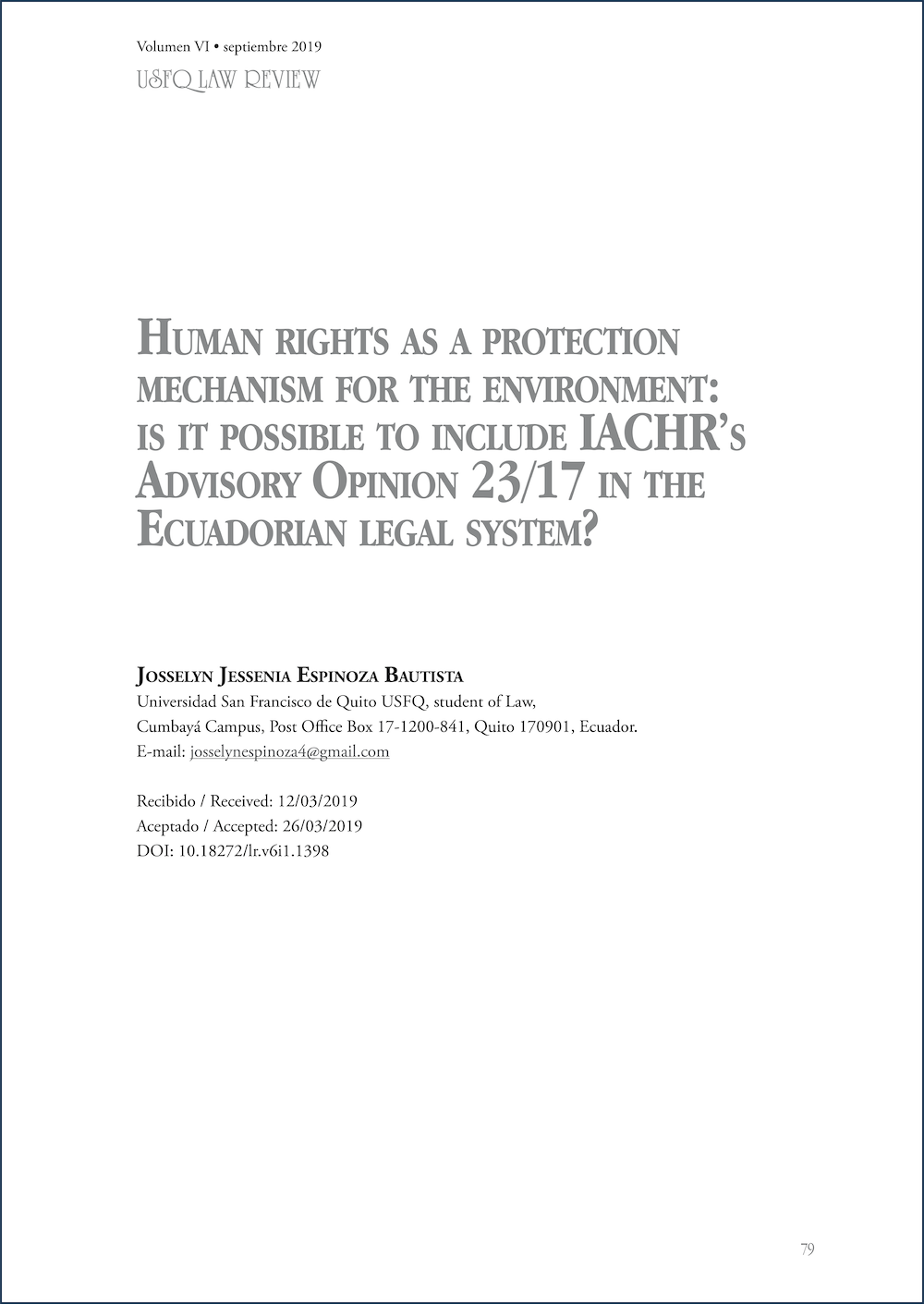Human Rights As a Protection Mechanism for the Environment
Is It Possible to Include IACHR"™s Advisory Opinion 23/17 in the Ecuadorian Legal System?
DOI:
https://doi.org/10.18272/lr.v6i1.1398Keywords:
environmental human rights, environment, protection mechanism, advisory opinion, Inter-American System, Inter-American Court of Human RightsAbstract
The Inter-American Court of Human Rights, on November 15th of 2017, issued an Advisory Opinion on the environment and human rights. The relevance of this Opinion is reflected in the development made by the Court on state obligations in relation to the environment. The Court recognized the "undeniable relationship between the protection of the environment and the realization of other human rights." In this virtue, this article seeks to scrutinize and synthesize the foundations of the Advisory Opinion. Finally, since advisory opinions are not binding nor obligatory for Ecuador (or any other state), this article develops an analysis on one possible solution (conventionality control) for the inclusion of the Advisory Opinion 23/17 in the Ecuadorian legal system.
Downloads
References
American Convention on Human Rights (1969). Article 64.
Bergkamp, Lucas. Liability and Environment. Private and Public Law Aspects of Civil Liability for Environmental Harm in an International Context. The Hague: Kluwer Law International, 2001.
Boddice, Rob. Anthropocentrism: Humans, Animals, Environments. Boston: Tuta Sub Aegide Pallas, 2011.
Brazilia Declaration of Judges on Water Justice (2018).
Commonwealth Human Rights Initiative. Open Sesame: Looking for the Right to Information in the Commonwealth. New Delhi: Spectra Visual World, 2003.
Constitution of the Republic of Ecuador. Article 71. Official Register No. 449 of October 20th, 2008.
Duvic Paoli, Leslie-Ann. The prevention principle in International Environmental Law. New York: Cambridge University Press, 2018.
Freestone, David and Hey, Hellen. The precautionary principle and International Law. The Hague: Kluwer Law International, 1996.
Giorgetti, Chiara. The Rules, Practice, and Jurisprudence of International Courts and Tribunals. Boston: Martinus Nijhoff Publishers, 2012.
Gudynas, Eduardo. Los Derechos de la Naturaleza y la Naturaleza de sus Derechos. Quito: Ministry of Justice, Human Rights and Culture, 2011.
Harrison, James. "Significant International Environmental Law Cases: 2017 - 2018". Journal of Environmental Law, Volume 30, Issue 3 (2018).
Inter-American Court of Human Rights. Advisory Opinion 1/82. September 24th, 1992.
Inter-American Court of Human Rights. Advisory Opinion 14/94. December 9th, 1994.
Inter-American Court of Human Rights. Advisory Opinion 16/97, November 11th, 1997.
Inter-American Court of Human Rights. Advisory Opinion 23/17 of November 15th, 2017.
Inter-American Court of Human Rights. Advisory Opinion 3/83. September 8th, 1983.
Inter-American Court of Human Rights. Almonacid Arrellano v. Chile. Judgment of September 26th, 2006. Series C No. 154.
Inter-American Court of Human Rights. Claude Reyes v. Chile. Judgment of September 19th, 2006. Series C No. 151.
Inter-American Court of Human Rights. Kichwa indigenous people of Sarayaku v. Ecuador. Judgment of June 27th, 2012. Series C No. 245
Inter-American Court of Human Rights. Lagos del Campo v. Perú. Judgment of August 31th, 2017. Series C No. 366
Inter-American Court of Human Rights. Official Summary issued by the Inter-American Court of Human Rights.
Inter-American Court of Human Rights. Request for an Advisory Opinion presented by the Republic of Colombia concerning the interpretation of Article 1(1), 4(1) and 5(1) of the American Convention on Human Rights. Costa Rica, 2016.
Inter-American Court of Human Rights. Saramaka people v. Suriname. Judgment of June 28th, 2098. Series C No. 172
International Court of Justice. Advisory Jurisdiction. https://www.icj-cij.org/en/advisory-jurisdiction (access on: 24/July/2018).
IUCN World Declaration on the Environmental Rule of Law (2016).
Knox, John. UN Report of the independent expert on the issue of human rights obligations related to the enjoyment of a safe, clean, healthy and sustainable environment. New York: United Nations General Assembly, 2012.
Lanza, Robert. Biocentrism: How life and Consciousness are the Keys to Understanding the True Nature of the Universe. Dallas: Benbella Books, 2009.
Larsson, Marie-Louise. The Law of Environmental Damage. The Hague: Kluwer Law International, 1999.
Macron, Emmanuel. "Speech by Emmanuel Macron for the United Nations General Assembly". United Nations General Assembly. Speech completed in New York City, United States, September 25th, 2018.
Manuel, Winograd. Environmental Indicators for Latin America and the Caribbean: Toward Land-Use Sustainability. Venezuela: ICCA Biblioteca Venezuela, 1995.
Moser, Berthold. The IAEA Conventions on Early notification of a Nuclear Accident and on Assisstance in the Case of a Nuclear Accident or Radiological Emergency. Nuclear Law Bulletin No. 44. France: Nuclear Energy Agency, 1989.
Regional Agreement on Access to Information, Public Participation and Justice in Environmental Matters in Latin America and the Caribbean (2018).
Soley, Ximena et al. Transformative Constutionalism in Latin America. The Emergence of a New Ius Commune. New York: Oxford University Press, 2017.
Statute of The Inter-American Court of Human Rights. Article 2. Resolution No. 448 adopted by the General Assembly of the OAS, October 1979.
Supreme Court of Justice of Colombia. Civil Appears Chamber. Sentence STC4360-2018, February 12th, 2018.
The Hague Court of Appeal. Urgenda Foundation v. The state of Netherlands. Ruling of October 9th, 2018.
The Rio Declaration on Environment and Development (1992). Principle 15.
Wrbka, Stefan; Van Uytsel, Steven; and Siems, Mathias. Collective Actions. Enhancing access to justice and reconciling multilayer interests? New York: Cambridge University Press, 2012.

Published
How to Cite
Issue
Section
License
In relation to copy rights, authors publishing with USFQ Law Review know and accept its internal policies, including but not limited to:
1. Open Access Policy.
2. Authorship Policy.
3. Copyright Policy.
4. Pre-Publication Policy.
5. Post-Publication Policy.
6. Intellectual Property Protection Policy.
7. Digital Preservation Policy.


